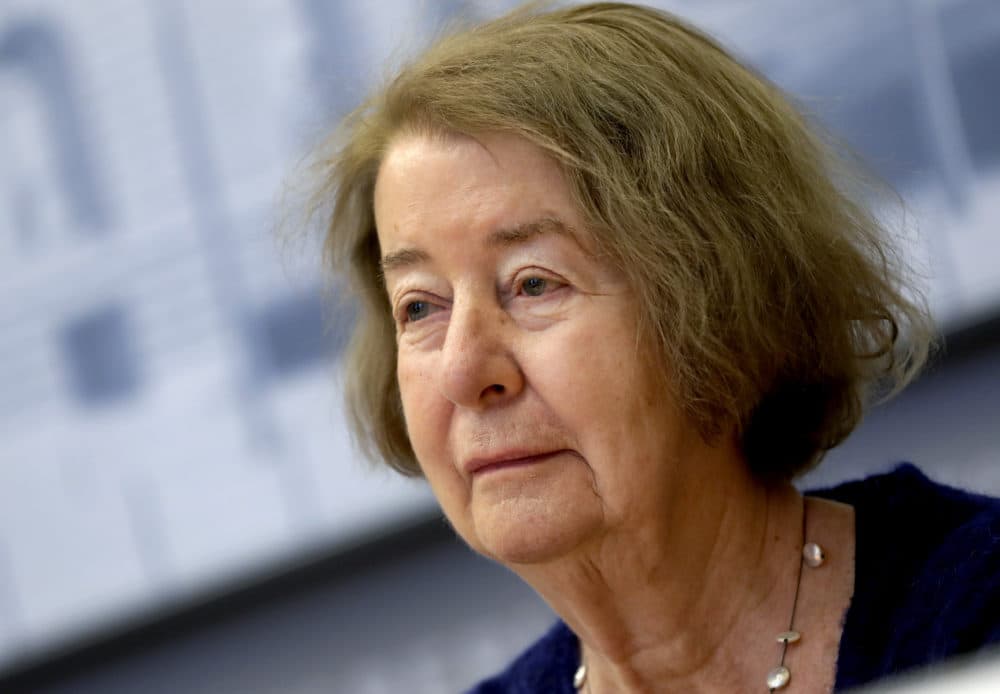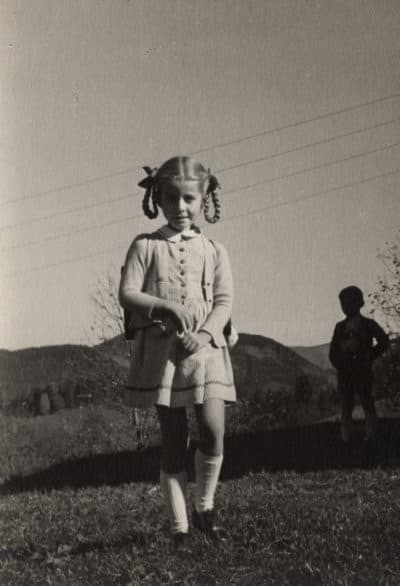Advertisement
Daughter Of Hitler's War Architect Has Made Fighting Against Anti-Semitism Her Life's Work
Resume
Anti-Semitic incidents are on the rise worldwide — in the United States, there was a reported 57 percent increase in 2017. That trend is being watched with concern by Hilde Schramm, who knows firsthand where it can lead.
Schramm, 82, is the daughter of Albert Speer, who was Adolf Hitler's chief architect and later war production minister.
She inherited paintings from her father that were not stolen — unlike so much art during World War II — that she sold in order to start the Zurückgeben Foundation. The organization sells artwork and other items gained by Germans during that terrible period in history to provide financial support for Jewish female artists.
Schramm, a former president of Germany's Green Party, has also started a movement to get all Germans to recognize that they likely benefited from the Jews' terrible losses.
"Very many people really benefited in very different ways," she tells Here & Now's Robin Young. "Some went to auctions where they could buy very cheap household objects, and the clothes and everything the Jews had owned, and others ... stepped into jobs that were empty because all Jews were expelled."
Schramm's charitable work was recently recognized with an Obermayer German Jewish History Award, presented in the Berlin Parliament. The award is given by Open the Circle, and pays tribute to non-Jewish Germans who make outstanding contributions to preserving the memory of Jewish communities.
Over the course of her life, Schramm says she has worked to reconcile her father's role in the Nazi regime — and leave a different legacy behind.
"When you are a child, you take it all naturally. You don't think much about it. My father was kind and friendly," she says. "When I became older, I knew that he was imprisoned and I know for what reason. And so I was forced to think about his participation, or leading function. So I had to work it out and get an attitude towards it, and also try to make my own and very different living, always on the background of knowing what happened in my own family."
Interview Highlights
On wanting to be known for her work rather than for being Speer's daughter, despite the connection between the two
"Most people in Germany know that I am the daughter of Albert Speer. But sooner or later, it is not so important anymore. There are many, many others in my generation who have had fathers or mothers or grandparents who were highly involved in this regime. So it's not something so special as you may think here in Germany."
"Yes, certainly I met Hitler. But I don't remember it. I saw it on the pictures later on television, but I don't remember it myself. Perhaps I don't want to remember it."
Hilde Schramm
On creating awareness about the ways in which Germans may have benefited from the Holocaust
"[There were] ... cases where in a village there perhaps were three stores who sold the same stuff, and then one had to give up his store. And of course the other two, without their willingness, they took advantage that there [was one] less to offer them the same, let's say, clothes. So sometimes it is willingly done. Sometimes it's really structurally done. Sometimes it is without intention. But still, they did profit — even if they took goods from a Jewish family as they were asked to take it, and when they would come back, they would agree to give it back. But they didn't come back."

On her father claiming he never knew about the Holocaust
"I'm sure he didn't want to know very deeply. He didn't want to know. But I think he must have known, yeah. I think he must have known."
On meeting Hitler when she was a child, and how she coped with her father's role in Nazi Germany growing up
"Yes, certainly I met Hitler. But I don't remember it. I saw it on the pictures later on television, but I don't remember it myself. Perhaps I don't want to remember it."
"I tried to find my own way. That was what I wanted to do, and I got good influences, like I was fortunate to be sent to the United States for one year. Then I met other people later, I had a Jewish teacher later, in history. She was a very remarkable woman. Later I wrote a book about her to find out how she survived and what she did. So ... you are not alone. You grow up in a community, so I didn't feel so exceptional."
On whether her work combating anti-Semitism, raising funds to support Jewish female artists and taking in refugees are an effort to overcome her family's history
"Certainly. My husband and me and others, we didn't want to live how our parents had live. We wanted to be open-minded, have an open house, help other people. I'm living in a house community. I've lived here since my children were born, because I wanted to have them grow up with other children."
On how she told her own children about what their grandfather had done
"I told them the truth, slowly and cautiously, and then later my children met my father, and so for them it was difficult to understand — as it is for me all the time still — that such a friendly man could have been not only affiliated, but have a leading position, in this horrible government which killed so awfully many people."
On if there's anything she's come to understand about her father
"Of course I try to reflect, and I think he was awfully ambitious, and this was part of it. He wanted to have power. At least I was more cautious in my life not to get into a situation where I don't look right and left anymore, but just be ambitious and work and work and be effective. So it's not only anti-Semitism. It's a complete lack of empathy, and that's exactly what not only me but I hope the majority of our society tries to avoid."
Karyn Miller-Medzon produced this interview and edited it for broadcast with Todd Mundt. Jack Mitchell adapted it for the web.
Correction: An earlier version of this post incorrectly stated that Schramm received the Obermayer German Jewish History Award from the German Bundestag. In fact, she received it from Open the Circle in the Berlin Parliament. We regret the error.
This segment aired on January 31, 2019.
